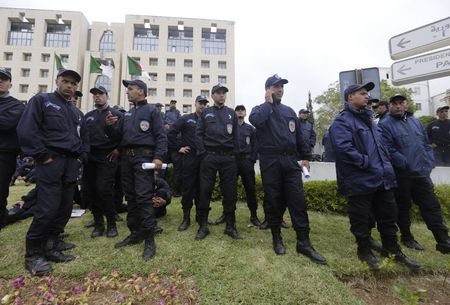By Lamine Chikhi
ALGIERS (Reuters) - Nearly a thousand Algerian policemen staged a sit-in outside President Abdelaziz Bouteflika's office in Algiers on Wednesday, demanding better working conditions on a third day of public protests by police officers.
Security forces rarely take to the streets in the North African state, where the Front de Liberation Nationale party and the military have dominated politics since 1962 independence from France, although protests over jobs and housing are common.
Chanting for the police chief to step down and singing the national anthem, officers in dark blue uniforms packed into the entrance of the presidential compound.
"We're under too much pressure, it's 48 hours without a break each time, it's too much pressure," said one officer, referring working shifts.
The protests in Algiers started on Tuesday when hundreds of officers marched through the streets in solidarity with colleagues near the southern city of Ghardaia, after officers there were injured in clashes between Arabs and Berbers.
The protests began with riot police units due to be sent to Ghardaia, but they were joined by members of other brigades.Riots had broken out on Monday between the two communities near the desert town, with two people killed, and shops set on fire. Officers in the region then staged marches to protest against working conditions and having to deal with the violence.
Ghardaia, about 600 km (370 miles) from Algiers, is home to both Arabs and the Mozabite Berber community, which speaks its own language and follows its own school of Islam. The area has often been the scene of clashes over jobs, houses and land.
Similar violence erupted in the area last year and at least five people were killed.
The police protests are unlikely to cause any wider security fallout for the OPEC country, with Algerians wary of turmoil or political upheaval after a 1990s war between the military and Islamist militants that killed 200,000 people.

The security forces are still battling remnants of an al Qaeda-linked insurgency and since the 2011 uprisings in neighbouring Tunisia, Libya and Eqypt, have been under pressure to contain any social unrest in their country.
(Writing by Patrick Markey; Editing by Louise Ireland)
